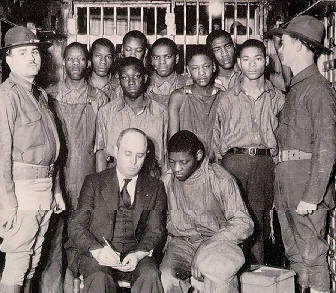In November of 1943, Dr. Rufus Clement (1900-1967), President of Atlanta (now Clark Atlanta) University, forced W.E.B. Du Bois (1868-1963) to resign his professorship effective the end of June 1944. Their views on the best course of action for Black Americans were incompatible, and Clement had the upper hand.
Pondering his next move, Du Bois conferred with James E. Shepard (1875-1947), a longtime friend and founder of North Carolina College (now North Carolina Central University) in the spring of 1944. Du Bois could have any position he wanted, Shepard promised. Perhaps Du Bois could continue editing Phylon, which he had founded at Atlanta U in 1940. Intrigued by this unforeseen offer, Du Bois replied in the affirmative, but said he’d need an assistant: at 76, he still had many plans but had to be realistic about how much sand remained in the upper bulb of his life’s hourglass.
Shepard recommended John Hope Franklin (1915-2009). His parents had named him after Du Bois’s friend, co-founder of the National Association for the Advancement of Colored People (NAACP), past president of Atlanta and then of Morehouse College until 1936. Shepard suggested that the young scholar could take over editing duties when Du Bois retired. (No mere mortal knew that almost two decades of activism and writing still lay ahead of him.) Shepard introduced the men to each other, and they seemed to have hit it off, but Franklin knew he was but one of several men under consideration, and no decision was forthcoming for two years.
Suddenly, however, this prospect evaporated. Walter E. White (1893-1955), NAACP Executive Secretary, met with Du Bois during his trip to New York later that spring (1944), inviting him to return to the organization he had co-founded in 1909—the one he resigned from acerbically a decade earlier. White offered him the position of Director of Special Research with an office in its Manhattan headquarters on West 40th Street across the street from the main building of the New York Public Library.
The reservations Du Bois may have had about returning did not prevail. “Had Dr. Du Bois returned to North Carolina College,” Franklin wrote, “founded a magazine [sic: Phylon had already been founded], and subsequently retired, leaving the periodical in my hands, I can only surmise that my future would have been quite different.” (Mirror to America: The Autobiography of John Hope Franklin, Farrar, Straus, and Giroux, 2005, 116-118.)
And not just his future. Moving to New York, Du Bois was back in the same city as Herbert Aptheker (1915-2003), the white author of American Negro Slave Revolts, which Columbia University published in 1943. Aptheker asked to meet; they kept their appointment sometime in mid-1946.
Franklin, a Harvard Ph.D., who was racially prevented from serving in the army at a level commensurate with his research training, but had years of teaching under his belt by the war’s end. Contrast his situation with that of Aptheker, a combat veteran of that war and a Columbia Ph.D., but one whose Communist Party affiliation in the early years of the Cold War made him academically radioactive. Also, a condition of his Guggenheim Fellowship (1946-1947) was that he couldn’t take any other employment.
In their conversations about editing Du Bois’s correspondence and papers, Aptheker suggested that he consider Black scholars not weighed down by Aptheker’s political baggage. Du Bois wouldn’t hear of it: Aptheker was “by far the best fitted person” for the job. (Gary Murrell, “The Most Dangerous Communist in the United States”: A Biography of Herbert Aptheker, UMass Press, 62-63)
Ironically, Du Bois regarded his decision to return to the NAACP to be, as Franklin put it, “the worst decision he ever made.” Franklin says Du Bois’s “second autobiography,” that is, Dusk at Dawn, attests to this, but a book published in 1940 could not report on an event that lay five years in its future. Chapter XIX of his third autobiography, however, written 1958-1959, is entitled “My Return to the NAACP.” (Therein one finds much evidence supporting the judgment “worst decision,” but not those very words.) The contrast between Du Bois’s satisfaction with Aptheker and dissatisfaction with White’s abuse of the privilege of hiring him could not be starker.
But for White’s invitation to Du Bois—unexpected, given their strongly divergent views on the priority of Black education and racial desegregation—it is virtually certain that Hugh Murray and I would not have worked as Aptheker’s research assistants on the Du Bois projects in the early 1970s. What shape those projects would have taken under another’s editorial supervision and institutional connections and resources is a matter of speculation. But it is speculation that invites reflection on the seeming contingencies of history.
























 The following of review of John L. Williams, CLR James: A Life Beyond the Boundaries (Constable, 2022) was
The following of review of John L. Williams, CLR James: A Life Beyond the Boundaries (Constable, 2022) was 
 ; the play
; the play  The following review of Mark R. Levin,
The following review of Mark R. Levin,